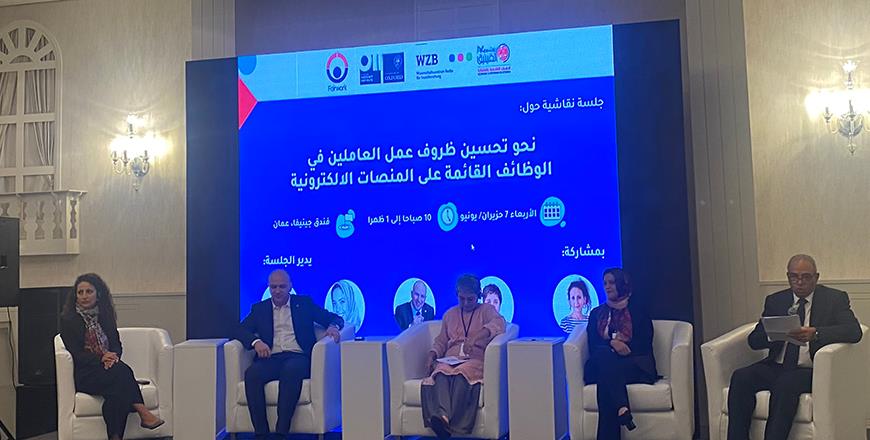(MENAFN- Jordan Times) AMMAN - The Phenix Centre for Economics and Informatics Studies on Wednesday held a panel discussion on improving working conditions for digital labour platform workers in Jordan and around the world.
The event was organised in collaboration with the Fairwork project, a research initiative based at the Oxford Internet Institute and the WZB Berlin Social Science Centre. It examines the standards and working conditions in the platform economy, according to a statement by the Phenix, made available to The Jordan Times.
The project recently concluded its four-day summit hosted by the Phenix Centre in Amman, featuring discussions and research presentations on the opportunities and challenges associated with the platform economy, the statement added.
The panel discussion featured renowned experts from the global team of the Fairwork project, alongside experts from Jordan and the Middle East and North Africa (MENA) region.
It looked into the role of digital labour platforms in the global economy, and overviewed strategies to promote sustainable and fair work environments in the MENA region and around the world.
Experts also provided insights on how to best address pressing labour issues within the sector, including the inclusion of platform workers in social security schemes, and improving the“weak” regulatory framework of the sector.
Ahmad Awad, lead researcher for Fairwork Jordan and director of Phenix Centre, said:“We believe that by bringing together diverse perspectives and expertise, we can generate meaningful discussions on how to shape the future of work in a manner that is fair, just and inclusive”.
He also noted that rapid technological developments are transforming the reality of work worldwide, leading to the emergence of new forms of employment and, at the same time, new challenges.
“Although platform work can help reduce unemployment and provide additional sources of income, it can also leave workers vulnerable to working conditions that don't meet international labour standards due to the absence of a regulatory environment,” he added.
Former minister of Digital Economy and Entrepreneurship in Jordan, Mothanna Gharaibeh, noted that organising the sector in a manner that ensures fair standards and working conditions requires properly understanding its dynamics.
With the right legislative environment, platform work can help alleviate the issue of unemployment in Jordan;“it's about using technology as a tool for justice to create opportunities where resources are scarce,” he added.
Batoul Al Mehdar, a senior researcher at The Access to Knowledge for Development Centre at the American University of Cairo, provided an overview of the platform economy in Egypt.
She noted that Egypt has a“sizeable” informal economy, as roughly 63 per cent of its labour force belongs to this class.
She added that although platform work created jobs amid high inflation rates and rising unemployment levels in Egypt, it remains fraught with risks and vulnerabilities that highlight the importance of organisation and government intervention.
Moreover, Mehdar stressed the importance of providing platform workers with social protection, because for many people in the MENA region, this form of work is a primary, rather than a secondary source of income.
Janaki Srinivasan, Associate Professor at the International Institute of Information Technology Bangalore, India, also agreed on the necessity of ensuring fair working conditions in the platform sector.
India is also faced by high levels of unemployment and informal employment with a marked increase in digital-technology-based gig work, according to Srinivasan.
Funda Ustek Spilda, a senior researcher and project manager at the Oxford Internet Institute at the University of Oxford, said that the Fairwork project is working on establishing a standard of working conditions that is applicable all over the world.
The project assesses digital labour platforms based on five principles aligned with international labour standards, including fair pay, fair conditions, fair contracts, fair management and fair representation, according to Spilda.




















Comments
No comment